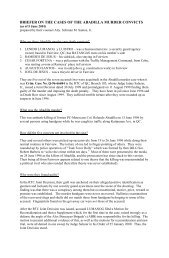Republic of the Philippines - Campaign
Republic of the Philippines - Campaign
Republic of the Philippines - Campaign
Create successful ePaper yourself
Turn your PDF publications into a flip-book with our unique Google optimized e-Paper software.
APPELLANTS’ BRIEF<br />
People <strong>of</strong> <strong>the</strong> <strong>Philippines</strong> vs. Fortuna, et. al.<br />
S. C. G. R. No. 141660-64<br />
Encarnacion and de Dios. Their “role” it seems was only to be charged for <strong>the</strong> Abadilla<br />
murder. As for <strong>the</strong> ABB angle <strong>of</strong> this murder, this is important as additional evidence to<br />
establish <strong>the</strong> innocence <strong>of</strong> all <strong>the</strong> accused, none <strong>of</strong> whom are ABB members. We shall<br />
discuss this more extensively under <strong>the</strong> last two assignment <strong>of</strong> errors. For now, we deal<br />
mainly with <strong>the</strong> probative value <strong>of</strong> <strong>the</strong> ballistics evidence, including vis-à-vis <strong>the</strong> so-<br />
called positive identification by <strong>the</strong> lone security guard eyewitness for <strong>the</strong> prosecution,<br />
Freddie Alejo.<br />
The prosecution had characterized <strong>the</strong> ballistics reports in <strong>the</strong> case at bar as<br />
“inconclusive and cannot exculpate <strong>the</strong> accused from liability, considering <strong>the</strong>y were<br />
positively identified by Alejo…” (Opposition dated October 25, 1999, p. 6). The trial<br />
court for its part, in its appealed Order <strong>of</strong> January 25, 2000 (Annex B, p. 8) stated: “In<br />
considering <strong>the</strong> testimony <strong>of</strong> expert witness Firearm Examiner Reynaldo de Guzman, this<br />
court found no sufficient reason to render as incompetent and incredible <strong>the</strong> testimony <strong>of</strong><br />
<strong>the</strong> eyewitness by <strong>the</strong> alleged finding or conclusion that <strong>the</strong> bullets and cartridge cases in<br />
<strong>the</strong> Abadilla murder match those in killings with a link to <strong>the</strong> ABB.” Note <strong>the</strong> trial<br />
court’s bias or weak appreciation <strong>of</strong> ballistics evidence by referring to <strong>the</strong> ballistics<br />
finding or conclusion as merely “alleged” when in fact it was <strong>the</strong> actual finding or<br />
conclusion. It, <strong>the</strong>refore, becomes necessary to rebut <strong>the</strong>se with authorities.<br />
All courts, including <strong>the</strong> Supreme Court no less, are familiar with <strong>the</strong> experience<br />
stated in Salomon vs. IAC (185 SCRA 352, 361-62), to <strong>the</strong> effect that “witnesses may<br />
forget or exaggerate what <strong>the</strong>y really know, saw, heard or did; <strong>the</strong>y may be biased and<br />
<strong>the</strong>refore tell only half-truths to mislead <strong>the</strong> court or favor one party to <strong>the</strong> prejudice <strong>of</strong><br />
<strong>the</strong> o<strong>the</strong>r.” This is why <strong>the</strong> Supreme Court directs that trial courts should not ignore<br />
physical evidence because “physical evidence is <strong>of</strong> <strong>the</strong> highest order. It speaks more<br />
eloquently than a hundred witnesses” (People vs. Bardaje, 99 SCRA 399).<br />
Page 109 <strong>of</strong> 127<br />
109




